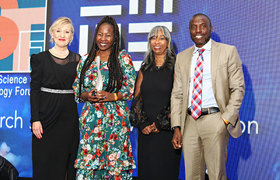The silent crisis of stillbirths in Africa
28 October 2025 | Story Velisile Bukula. Photo iStock. Read time 4 min.
The University of Cape Town (UCT) has joined leading continental and global health partners in the fight to confront Africa’s silent crisis of stillbirths. Each year, nearly one million babies are stillborn across the continent, most from preventable causes that remain hidden in data gaps and policy blind spots.
A new report, “Improving Stillbirth Data Recording, Collection and Reporting in Africa”, highlights the urgent need for stronger systems to count every stillbirth and turn data into action. The study, conducted by UCT, Africa Centres for Disease Control and Prevention (CDC), United Nations Children’s Fund (UNICEF), and the London School of Hygiene and Tropical Medicine (LSHTM), provides the most comprehensive assessment yet of how stillbirths are recorded and reported across 33 African Union member states.
As a key research partner, UCT brings scientific expertise and leadership to a growing continental effort to build stronger, more accountable health systems that ensure every life is counted and no family’s loss goes unseen.
Although most countries report capturing stillbirths through their health systems, the findings show persistent and significant gaps in national policies, data quality and implementation. Without accurate, consistent information, the scale of loss remains hidden and opportunities to prevent future stillbirths are missed.
“Our next step is to ensure data informs policy, practice and compassion for families who experience loss.”
Stillbirths are a sensitive barometer of health system performance, reflecting access to quality antenatal, intrapartum and emergency care. While maternal mortality has long received policy attention, stillbirths have remained on the margins of national targets and global accountability frameworks.
Professor Salome Maswime, the head of Global Surgery Division at UCT, said: “We have evidence of what works and where systems are strong. Our next step is to ensure data informs policy, practice and compassion for families who experience loss.”
Advancing materinal and perinatal health equity
UCT’s involvement underscores Africa’s capacity to drive solutions grounded in regional evidence and leadership. The university’s Global Surgery Division has been at the forefront of advancing maternal and perinatal health equity through data-driven research and policy engagement across the continent.
Africa CDC deputy director-general, Dr Raji Tajudeen, said: “Behind each stillbirth is a mother, a family and a story that must be counted. We need stronger data systems and call on countries to integrate stillbirth data into their national systems and accelerate progress towards zero preventable deaths.”
“With the right investments in systems, policies and accountability, stillbirths can be prevented.”
More than two-thirds of the surveyed countries now include stillbirths in national health strategies, and over half have set measurable reduction targets. This marks a growing political commitment to addressing a long-neglected issue.
“This report shows that progress is possible,” added Dr Mary Kinney, the lead researcher on the study from UCT. “Some countries are already using high-quality data to drive action, proving that with the right investments in systems, policies and accountability, stillbirths can be prevented.”
Associate professor at the LSHTM Dr Hannah Blencowe emphasised: “Accurate, consistent reporting of stillbirths is essential to guide clinical practice, strengthen surveillance and target resources where they are needed most.”
Drive meaningful change
Aligned with the Campaign on Accelerated Reduction of Maternal Mortality in Africa (CARMMA Plus 2021–2030), the report calls for sustained investment in digital health information systems, respectful bereavement care, skilled health workers, and regional collaboration. It also calls for every stillbirth to be counted and reviewed to drive meaningful change.
The report categorises countries by readiness: those with mature systems needing refinement, those with partial systems requiring targeted support, and those building foundational policies. It calls for strong national leadership and accountability to integrate stillbirth data into routine health systems and planning.
 This work is licensed under a Creative Commons Attribution-NoDerivatives 4.0 International License.
This work is licensed under a Creative Commons Attribution-NoDerivatives 4.0 International License.
Please view the republishing articles page for more information.










